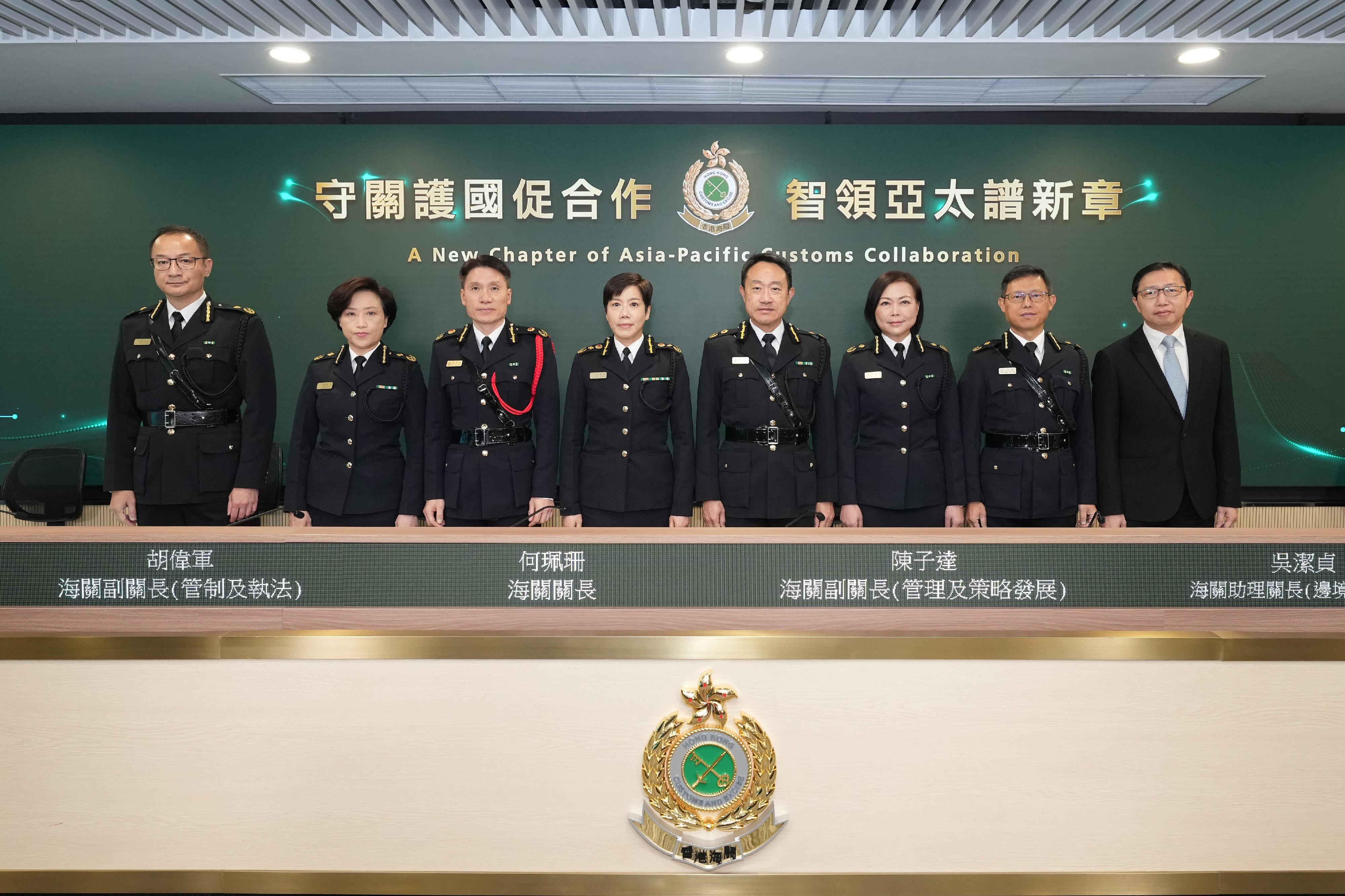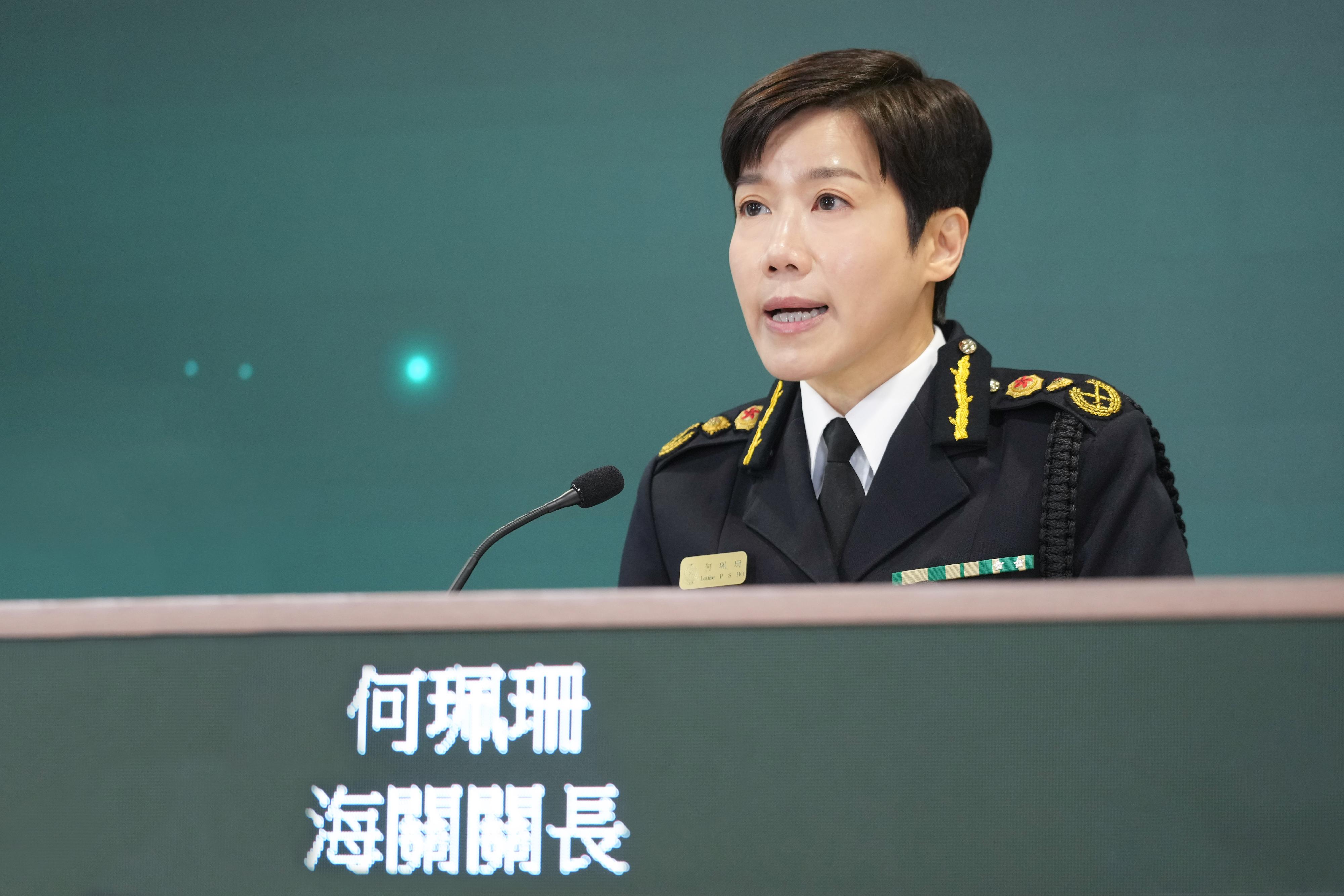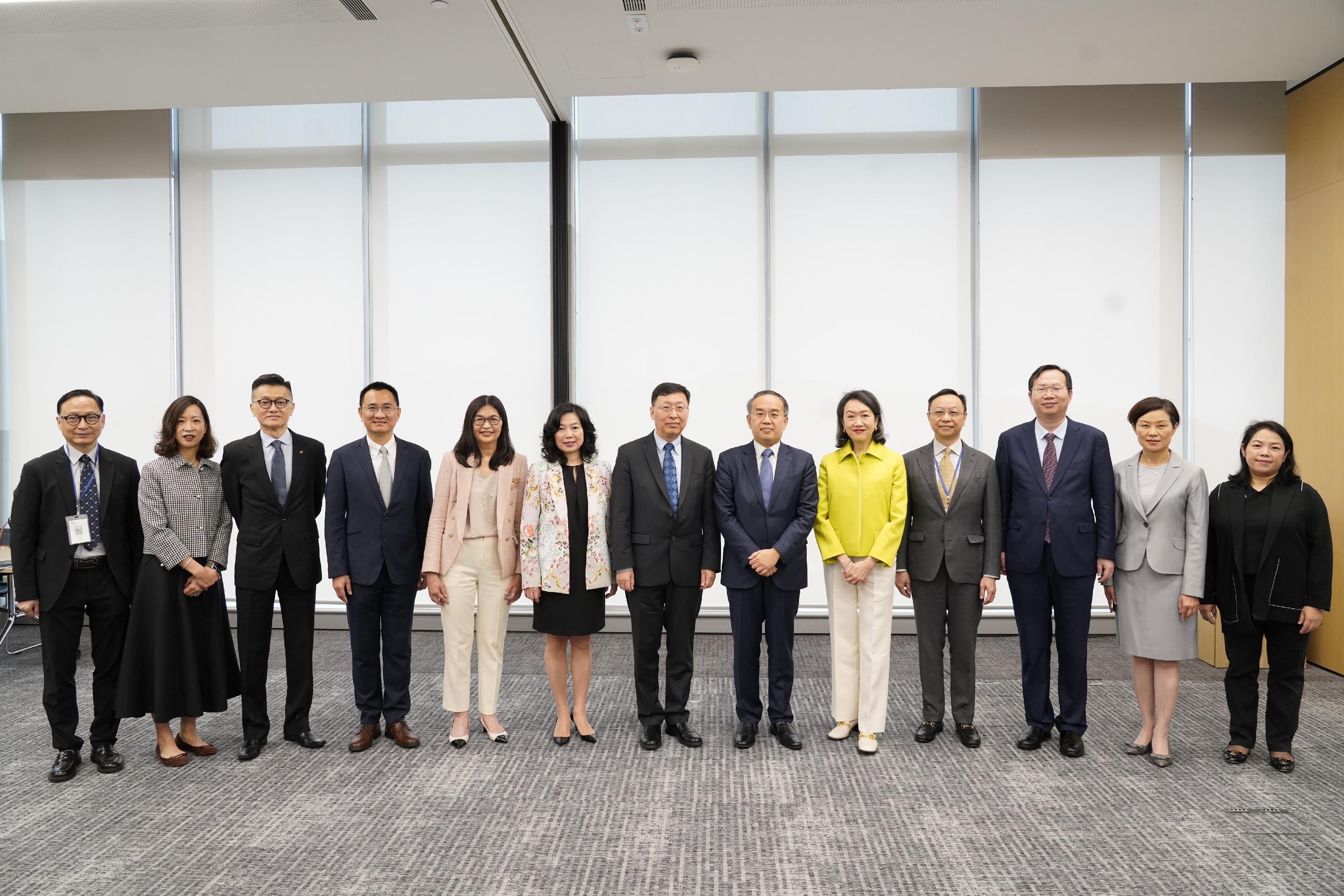The Commissioner of Customs and Excise, Ms Louise Ho, chaired Customs’ 2023 year-end press conference held at the Customs Headquarters Building today (March 27) to give a review of the department’s law enforcement results and sustainability in the provision of trade and clearance facilitation during the year. Ms Ho also outlined the department’s determination to strengthen agreements with existing counterparts while actively exploring mutually beneficial co-operation with new partners, so as to achieve the goal of creating “a new chapter of Asia-Pacific customs collaboration”.
Overall enforcement situation
———————————
In 2023, a total of 19 120 cases were detected, a 1.7-fold increase from the 2022 figure. About 62 per cent of the cases are related to illicit cigarettes, followed by cases related to dangerous drugs and intellectual property rights infringement.
Dangerous drugs
——————-
In 2023, 1 362 drug cases were detected, which was a 46 per cent increase from the 2022 figure. A total seizure of about 9.5 tonnes of drugs was made, representing a surge of 37 per cent from 2022.
The five major drug seizures in order of quantity were cannabis (2 423.2 kilograms, a 2-fold increase), methamphetamine (“Ice”) (2 212.4kg, a 29 per cent decrease), cocaine (2 057.9kg, a 1-fold increase) and ketamine (1 809.3kg, a 1.9-fold increase), while the total heroin seizure increased 2.6-fold to 332.5 grams compared to 2022’s figure.
Customs noticed that the two-pronged approach has become the latest mode in drug trafficking, which is drug syndicates hiring travelers to traffic drugs by an “ant-moving-home” approach, and by means of a large-scale transport of goods in parallel. As global drug production continues to rise, in particular cocaine and “Ice”, the number of major cases detected by Customs has also observed a significant increase in quantity. In view of the latest trend in drug trafficking, Customs has formulated targeted measures and co-operated with law enforcement agencies on the Mainland and overseas to enhance the effectiveness of law enforcement.
Smuggling
————
A total of 221 smuggling cases were detected last year, representing a decrease of 2 per cent from 2022. The total seizure value increased 1.4-fold to $3.165 billion.
Being aware that smuggling syndicates smuggled large quantities of high-value goods to the Mainland through various means, Customs last year actively strengthened collaboration with the Anti-Smuggling Bureau of Mainland Customs and detected numerous large-scale sea smuggling cases.
After the full resumption of normal travel between Hong Kong and the Mainland, parallel trading activities were broadly held in check. A mechanism for joint operations was established between customs administrations of the two sides. With notifications of suspected parallel traders engaging in smuggling activities, detection of parallel traders was enhanced. Joint operations targeting activities by parallel trade syndicates with Mainland customs were also stepped up.
Illicit cigarettes
——————
On the anti-illicit cigarette operation front, the number of detected cases in 2023 increased by 2.4-fold to 11 805 cases from 2022, with 652 million cigarettes seized, representing an 11 per cent drop as compared to 2022’s figure.
Cross-boundary passenger and vehicle trips bounced back following the full resumption of normal travel between the Mainland and Hong Kong early last year. Due to the increased duty on cigarettes announced in the Budget, enhanced enforcement actions against visitors bringing in excessive quantities of duty-free cigarettes and the selling and buying of illicit cigarette activities in town, the number of illicit cigarette cases detected by Customs significantly surged last year. Illicit cigarette syndicates still mainly smuggle illicit cigarettes into Hong Kong by sea, yet the quantity of illicit cigarettes being smuggled each time has been reduced on average. Smugglers have switched to an “ant-moving-home” approach by smuggling illicit cigarettes in batches to minimise the economic loss caused by the interception of Customs, resulting in a shrinking in the overall seizure of illicit cigarettes.
Intellectual property rights
——————————
Customs detected 703 intellectual property rights infringement cases last year, representing an annual increase of 34 per cent. The seizure value of infringing items increased 60 per cent to around $288 million (730 000 items) as compared to 2022’s figure.
As for Internet infringement, 101 cases were detected, representing an increase of 26 per cent from 2022. Customs also referred information of 161 copyright-infringing websites to Interpol and Europol for follow-up actions and assistance in removal of related websites.
In accordance with the implementation of the Copyright (Amendment) Ordinance 2022, Customs last October applied, for the first time, “communication rights” in enforcement operations against infringement activities involving illegal streaming devices.
Money laundering
——————–
Customs last year detected 10 money laundering cases with $12.28 billion involved, representing a surge of 11 per cent and an increase 1.4-fold compared with the 2022’s figures respectively.
Consumer protection
————————
Customs last year received 18 982 complaints regarding suspected cases of violating the Trade Descriptions Ordinance (TDO), representing an increase of 2.1-fold from 2022. Among them, 18 063 complaints were handled:
(i) With regard to 14 892 complaints, a total of 96 investigation cases were made after consolidation, mainly involving allegations of false trade descriptions, wrongly accepting payments and misleading omissions;
(ii) The remaining 3 171 complaints have been closed since they were not in contravention of the TDO, or have been referred to other relevant law enforcement agencies or agencies for follow-up actions.
The substantial increase in complaints involving goods recorded last year stemmed from mass complaints over an online diaper retailer for engaging in wrongly accepting payments. Customs last year successfully prosecuted 40 cases which involved contravention of the TDO and many cases received stiff sentences, with courts employing deterrent effects through imposed imprisonments.
Following the full resumption of normal travel between Hong Kong and the Mainland, complaints on medicine shops involving quantities of unclear pricing units in selling ginseng and dried seafood, or Chinese medicine (also known as cases concerning catty, tael and mace) or sale of proprietary medicines increased significantly to a total of 535 cases, among which 84 per cent were made by Mainland visitors. The department’s Quick Action Team was deployed to handle and follow up with complaints by short-term visitors to Hong Kong, and 201 such complaints were handled last year. Customs is also committed to conducting public education through various channels in unveiling to Mainland visitors common unfair trade practices by medicine shops, deploying mobile promotion vehicles at popular tourist hotspots during festivals, and conducting patrols with the Travel Industry Authority and promoting compliance among traders.
Situation of full resumption of normal travel with Mainland
—————————————————————–
Since the full resumption of normal travel with the Mainland last year, the number of inbound and outbound passenger and vehicle trips at each control point has recovered to about 65 per cent compared with the same period before the 2019 epidemic. During various important festivals, Hong Kong, Guangdong and Macao Customs worked closely together to provide timely notifications and response measures to ensure smooth operations of the control points. To prevent members of the public and Mainland tourists from breaching the law and bringing contraband into and out of Hong Kong inadvertently, Customs also stepped up efforts to publicise the regulations about importation and exportation through multiple channels.
“Northbound Travel for Hong Kong Vehicles” (the Scheme) has been well received by members of the public. Since the implementation of the Scheme on July 1 last year to March 25 this year, a total of about 582 000 private vehicle trips entering and exiting Hong Kong via the Hong Kong-Zhuhai-Macao Bridge (HZMB) Hong Kong Port were recorded.
Trade and clearance facilitation
———————————–
Customs has continued to facilitate trade and clearance and implement various related measures.
(1) Hong Kong Customs, the Airport Authority Hong Kong, Mainland Customs and the Zhuhai Municipal Government, actively utilise the advantages of Hong Kong International Airport and the HZMB, together with an innovative mode and technology, to promote Intermodal Transhipment of Air and Land Cargo, which will speed up customs clearance and create a dedicated express route for air and land fresh and live products. High-quality food from the Mainland can be exported to overseas markets, while fresh products from other places are introduced into the Mainland. The scheme is expected to be implemented in the second quarter of this year.
(2) As of last year, Hong Kong Customs ratified the Hong Kong Authorized Economic Operator (AEO) Mutual Recognition Arrangement (MRA) with 14 economies, in which eight of them are economies along the Belt and Road. Regarding the Association of Southeast Asian Nations (ASEAN) and the Cooperation Council for the Arab States of the Gulf (GCC), Hong Kong Customs signed MRAs with customs authorities of Singapore, Thailand, Malaysia and Indonesia, while an MRA with Bahrain will also be signed in the first half of this year. Action Plans for the AEO Mutual Recognition Arrangement with Cambodia, the Philippines and Saudi Arabia Customs were also signed which marked an important step of implementing mutual arrangements in the future.
(3) The Single E-lock Scheme was extended to Hunan Province last year, which was the first province apart from the Guangdong Province to implement the Scheme, and it is projected to be extended to Jiangxi Province, Henan Province and Sichuan Province. The Guangdong-Hong Kong-Macao Three-Places-One-Lock Scheme was officially launched in February this year, expediting logistics connectivity in the Guangdong-Hong Kong-Macao Greater Bay Area (GBA).
(4) Guangdong and Hong Kong actively fostered the “Single Submission for Dual Declaration” Scheme in the past year, and officially launched the Scheme at the HZMB on February 1 this year to enable enterprises to enjoy the convenience of completing Customs declarations for both the Mainland and Hong Kong sides by making a single submission of cargo information, enhancing customs clearance efficiency between the two places. Hong Kong and Shenzhen Customs are also exploring ways to implement the Scheme to other land boundary ports connected with Shenzhen in order to foster economic development.
(5) Hong Kong, Guangdong, and Macao Customs actively built the Guangdong-Hong Kong-Macao Customs Clearance Information Platform last year. The information platform will provide a wide range of services through an Internet site and a mobile application, such as customs regulations, announcements, clearance guidelines, enforcement cases and clearance situations at control points of the three places, as well as an online intelligent chatbot to answer public inquiries. By providing a one-stop service for travellers and the transportation industry in the three places, the border clearance efficiency and flow of people and goods within the GBA will be enhanced. The three Customs authorities will sign a co-operation agreement and officially launch the platform in the first half of this year.
(6) To cope with the rapid development of the global electronic commerce industry, Customs actively promoted the Cross-boundary Express Cargo Clearance Facilitation Arrangement (CEFA) last year, introducing an innovative customs clearance model of “free flow through the first line and efficient control at the second line” to qualified logistics providers. Through pre-assessing the risk of goods based on the declared cargo information from logistics providers and utilising technology monitoring, the transportation of parcels will be uninterrupted and the time spent on loading, unloading and locating parcels which are inspected at Hong Kong ports will be reduced. A trial run of the arrangement is planned to be conducted in the first half of this year on international parcels transported from the Mainland to Hong Kong via land ports, followed by a phased expansion.
Smart Customs
——————
Customs continued to put forward the development of Smart Customs last year and introduced the Smart Under Vehicle Robot and the Smart Seizure Management System. The former utilises artificial intelligence (AI) for high-definition image comparisons, further assisting Customs officers in inspecting cross-boundary vehicles and preventing smuggling activities. Leveraging technology to assist in managing a large number of items seized in cases, the latter helps to enhance the security of seizure management and optimise the storage capacity and management efficiency of seizure warehouses.
Also, Customs developed the Smart Customs Interactive Response System, including an AI chatbot and the Virtual Customs Ambassador, XiaoHui, last year. Applying technologies, including AI and natural language processing, in conjunction with a massive central knowledge base of Customs, instant and appropriate responses are offered to enquiries made by members of the public and travellers. Over 16 000 enquiries were handled by the System since its inception, lessening the workload of Customs officers.
The Trade Single Window (TSW) has been rolled out in phases since 2018. Apart from being the operator, Hong Kong Customs also actively participates in developing the information technology infrastructure of the TSW Phase 3 which will establish a new and highly automatic cargo clearance model and an efficient cargo risk assessment system. Phase 3 is projected to be launched in phases in 2026.
Human resources and training
———————————-
Last year, the department adopted a more active recruitment strategy. In addition to the existing recruitment promotion, including participating in large-scale career fairs and organising seminars, recruitment promotion vehicles were deployed to visit different tertiary institutions to facilitate on-the-spot applications. Last year, more than 7 500 applications were received for the recruitment of Customs Inspectors, an increase of 74 per cent compared with 2022. About 8 500 applications were received for the recruitment of Customs Officers, representing an about 21 per cent increase. About 80 Customs Inspectors were recruited through open recruitment and in-service appointments, and over 190 Customs Officers were recruited through a year-round recruitment exercise.
To fill retirement vacancies and provide manpower for other services to meet the department’s work and development needs, about 90 Customs Inspectors and 200 Customs Officers will be recruited in 2024. A new recruitment round for Customs Inspectors will be opened for application in the second quarter of this year.
Additionally, the department will sign a memorandum of co-operation with the Vocational Training Council this April to deepen collaboration and exchanges in talent training, recruitment and employment.
National security education
——————————
This year marks the 10th anniversary of the proposal of the holistic view of national security. Hong Kong Customs will continue to deepen the understanding of safeguarding national security and national affairs of all officers.
At the same time, Customs is dedicated to nurturing the sense of belonging to and patriotic feelings for the country of young people. A series of study tours, including a tour to the GBA, visits to Xi’an, Dunhuang and the Silk Road, a trip to Shaoshan of Hunan Province, as well as a tour to Chairman Mao Zedong’s former residence and the Mao Zedong Relic Museum were organised by “Customs YES” to increase the understanding of history and culture of the country last year.
Hong Kong Customs is also determined to support the National Security Education Day organised by the Committee for Safeguarding National Security of the Hong Kong Special Administrative Region and enhance public understanding of Customs’ work and effectiveness in safeguarding national security.
International co-operation
—————————–
The co-operation between Hong Kong Customs and customs and enforcement agencies around the world has a long history, and the Customs Co-operative Arrangement (CCA) serves as the cornerstone for establishing and maintaining these co-operative relationships. As of last year, Hong Kong Customs signed the CCA with 31 customs authorities worldwide, as well as with five member states of ASEAN. Furthermore, Hong Kong Customs actively engages in co-operative negotiations with customs authorities of other ASEAN member states, including Brunei, Laos, Malaysia, Myanmar, and the Philippines. Moreover, Hong Kong Customs has commenced CCA discussions with the Customs administrations of Saudi Arabia, United Arab Emirates, Bahrain and Qatar in the GCC.
In the previous year, Hong Kong Customs organised a number of large-scale international events, including the Regional Customs High-level Drug Enforcement Forum, the Regional Drug Enforcement Capacity Building Workshop, and the AEO Expert Mission and Symposium for ASEAN and Hong Kong, China. The 6th World Customs Organization Global Canine Forum was also held for the first time in Asia earlier this month, signifying the leadership role of canine training in the Asia Pacific region of Hong Kong Customs. As well, Customs held the Regional High-Level Conference on IP Protection and signed a memorandum of understanding on IP protection co-operation with the Quality Brands Protection Committee of the China Association of Enterprises with Foreign Investment to deepen co-operation.
Hong Kong Customs received a unanimous nomination from other 33 members of the Asia/Pacific Region last June to become the next World Customs Organization Vice-Chairperson this coming July. Hong Kong Customs will establish a Secretariat Office to provide support to the work of the Vice-Chairperson for the A/P Region. During the two-year tenure, the department plans to organise around 20 international conferences, workshops and other enforcement operations or capacity building projects at global or regional levels. Customs also plans to organise meetings or co-operation projects on Smart Customs and AEO to improve the efficiency of trade facilitation.
Conclusion
————
Concluding her briefing, Ms Ho pledged that the department would maintain its unity to maintain national security, foster international trade and nurture a favorable environment for legal trade.






